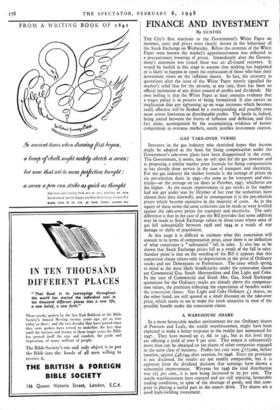FINANCE AND INVESTMENT
By CUSTOS
THE' City's first reactions to the Government's White Paper on incomes, costs and prices were clearly shown in the behaviour of the Stock Exchange on Wednesday. Before the contents of the White Paper were known the market's apprehensiveness was reflected in a precautionary lowering of prices. Immediately after the Govern- ment's statement was issued there was an all-round recovery. It would be foolish at this stage to assume that nothing has happened or is likely to happen to upset the enthusiasm of those who base their investment views on the inflation theory. In fact, the recovery in quotations after the issue of the White Paper merely signalled the market's relief that for the present, at any rate, there has been no official intimation of any direct control of profits and dividends. My own feeling is that the White Paper at least contains evidence that a wages policy is in process of being formulated. It also carries an implication that any tightening up on wage increases which becomes really effective will be flanked by a corresponding and possibly even more severe limitation on distributable profits. The battle is, indeed, being joined between the forces of inflation and deflation, and this fact alone, accompanied by the accumulating evidence of keener competition in overseas markets, surely justifies investment caution.
GAS TAKE-OVER TERMS Investors in the gas industry who cherished hopes that income might be adopted as the basis for fixing compensation under the Government's take-over plans have been disappointed in the event. The Government, it seems, has no soft spot for the gas investor and is proposing a similar market price formula for fixing compensation as has already done service in the case of transport and electricity. For the gas industry the market formula is the average of prices on six pre-election dates in 1945—the same as for transport and elec- tricity—or the average on six dates in October, 1947, whichever are the higher. As the recent improvement in gas stocks in the market had not got under way by October of last year the authorities have chosen their date shrewdly, and in consequence it is the pre-election prices which become operative in the majority of cases. As to the equity of these terms the same criticisms can be made as were levelled against the take-over prices for transport and electricity. The only difference is that in the case of gas the Bill provides that some addition may be made to Stock Exchange values in those cases where sales of gas fell substantially between 1938 and 1944 as a result of war damage or shifts of population.
At this stage it is difficult to estimate what this concession will amount to in terms of compensation price, since there is no definition of what constitutes a " substantial " fall in sales. It also has to be shown that Stock Exchange prices fell as a result of the fall in sales. Another point is that on the wording of the Bill it appears that this concession clause relates only to depreciation in the price of Ordinary stocks and not Debentures or Preferences. The cases which spring to mind as the most likely beneficiaries under the concession clause are Commercial Gas, South Metropolitan and GaS Light and Coke. In the case of Commercial and South Met. Gas, Stock Exchange quotations for the Ordinary stocks are already above the compensa- tion values, the premium reflecting the expectation of benefits under the concession clause. Gas Light and Coke Ordinary Lx shares, on the other hand, are still quoted at a small discount on the take-over price, which seems to me to make the stock attractive in view of the possible benefit under the concession clause.
A WAREHOUSE SHARE
In a more favourable market environment the zos. Ordinary shares of Pawsons and Leafs, the textile warehousemen, might have been expected to make a better response to the results just announced for 1947. They have moved up Is. 6d. to 24s., but at this level they are offering a yield of over 8 per cent. This return is substantially more than can be obtained on the shares of other companies engaged in the same class of business. Profits last year were k175,000, before taxation, against £48,744, after taxation, for 1946. Since tax provision is not disclosed, the results are not readily comparable, but it is apparent from the dividend decision that earnings have shown• a substantial improvement. Whereas for 1946 the total distribution was 124 per cent., it is now being increased to 20 per cent. The textile warehousemen have enjoyed and are still enjoying favourable trading conditions, in spite of the shortage of goods, and this com- pany is playing a useful part in the export drive. The shares are a good high-yielding investment.






























 Previous page
Previous page